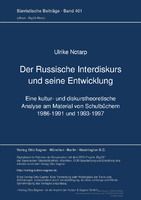Der Russische Interdiskurs und seine Entwicklung
Eine kultur- und diskurstheoretische Analyse am Material von Schulbuechern (1986-1991 und 1993-1997)
Abstract
The present work is an empirical analysis of Soviet Socialist and Russian textbooks. Its aim is to reconstruct essential parts of the Soviet and Russian interdisciplinary discourse. It should be found out how the Soviet and Russian interdisciplinary content is structured and how it is socialized in textbooks. The underlying problem of the work as a whole is the question of the possibilities of describing and explaining the culture-specific language or culturally marked communication which generally occurs in cultures and the mechanisms of their functioning. It is therefore about the explanation of the phenomenon of "culture-specific communication", which is known from everyday experience, which becomes particularly obvious, for example, if one does not feel understood in a foreign culture or can not understand the behavior of others, precisely because it is " culturally specific "is different from what is taken for granted and" normal "in one's own culture. Bei der vorliegenden Arbeit handelt es sich um eine empirische Analyse sowjetischsozialistischer und russischer Schulbücher. Diese hat das Ziel, wesentliche Teile des sowjetischen und russischen lnterdiskurses zu rekonstruieren. Es soll herausgefunden werden, wie der sowjetische und der russische Interdiskurs inhaltlich aufgebaut sind und wie sie in den Schulbüchern sozialisiert werden. Das der Arbeit insgesamt zugrunde liegende Problem besteht in der Frage nach Möglichkeiten der Beschreibung und Erklärung der in Kulturen allgemein auftretenden "kulturspezifischen Redeweise" bzw. kulturell markierten Kommunikation und den Mechanismen ihres Funktionieren. Es geht also um die Erklärung des aus der Alltagserfahrung bekannten Phänomens "kulturspezifischer Kommunikation", das beispielsweise immer dann besonders deutlich zutage tritt, wenn man sich in einer fremden Kultur unverstanden fühlt, bzw. das Verhalten der anderen nicht nachvollziehen kann, eben weil es "kulturspezifisch" anders ist, als das in der eigenen Kultur für selbstverständlich und "normal" gehaltene.
Keywords
Soviet socialist; Russian textbooks; interdisciplinary discourse; 1986; 1991; 1993; 1997; Analyse; Diskursanalyse; diskurstheoretische; Eine; Entwicklung; formale Repertoire der Normative; Interdiskurs; Kollektivsymbole; Konstruktivismus; kultur; Kulturelle Normen; Material; Notarp; Russische; Schulbüchern; seineDOI
10.3726/b12654ISBN
9783954790395OCN
1082941868Publisher website
https://www.peterlang.com/Publication date and place
Bern, 2001Series
Slavistische Beitraege, 401Classification
History


 Download
Download